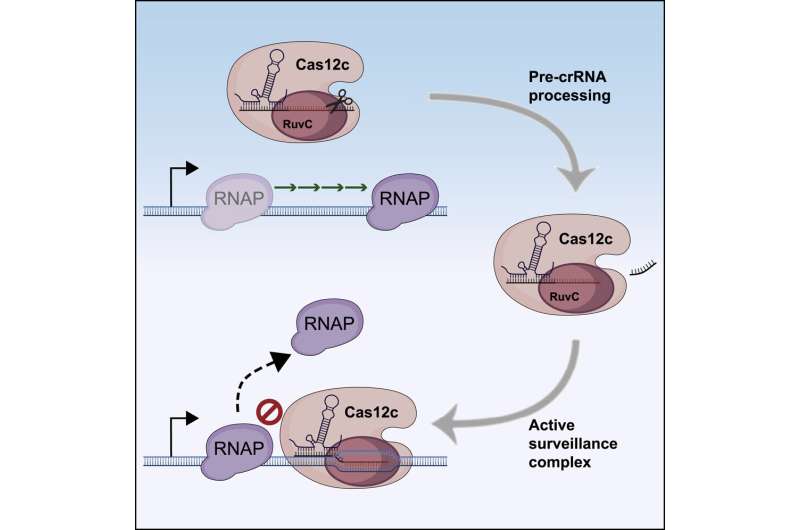June 7, 2022 report
Cas12c provides antiviral immunity without the need to cut DNA

A trio of researchers at the University of California, Berkeley, has found that the protein Cas12c can provide antiviral immunity for bacteria without the need to cut DNA. In their paper published in the journal Molecular Cell, Carolyn Huang, Benjamin Adler and Jennifer Doudna report that Cas12c is site-specific and able to generate mature CRISPR RNAs from precursor transcripts.
Over the past several years, the CRISPR-Cas9 gene editing technique has been explored for treating many genetic ailments. Hopes have dimmed more recently as research has found that it is difficult to control and could lead to undesirable outcomes. Still, researchers hope to make the technique more precise and therefore more useable.
Meanwhile, other researchers have turned their attention to the protein Cas12c, which prior research has shown provides bacteria some degree of protection from viral invaders. However, it does so without cleaving DNA strands, creating doubts that it is a viable treatment option. In this new effort, the researchers took a closer look at Cas12c, and discovered how it provides protection for bacteria and report that it might prove useful as a therapeutic device for humans after all.
The work involved experiments designed to confirm that Cas12c does not cut or insert its own DNA into a host. They tested it with single strand, double strand and even long and short strands and found it did not cut any of them. Instead, they found it cut a preliminary version of a precursor gRNA instead, which turned out to be the part of the RNA that was needed to serve as a guide in CRISPR systems. Without the RNA, a virus would be unable to conduct transcription, effectively shutting down viral interference. The researchers conclude that Cas12c uses targeted DNA binding to provide protection for bacteria against viral attacks.
More information: Carolyn J. Huang et al, A naturally DNase-free CRISPR-Cas12c enzyme silences gene expression, Molecular Cell (2022). DOI: 10.1016/j.molcel.2022.04.020
Journal information: Molecular Cell
© 2022 Science X Network





















